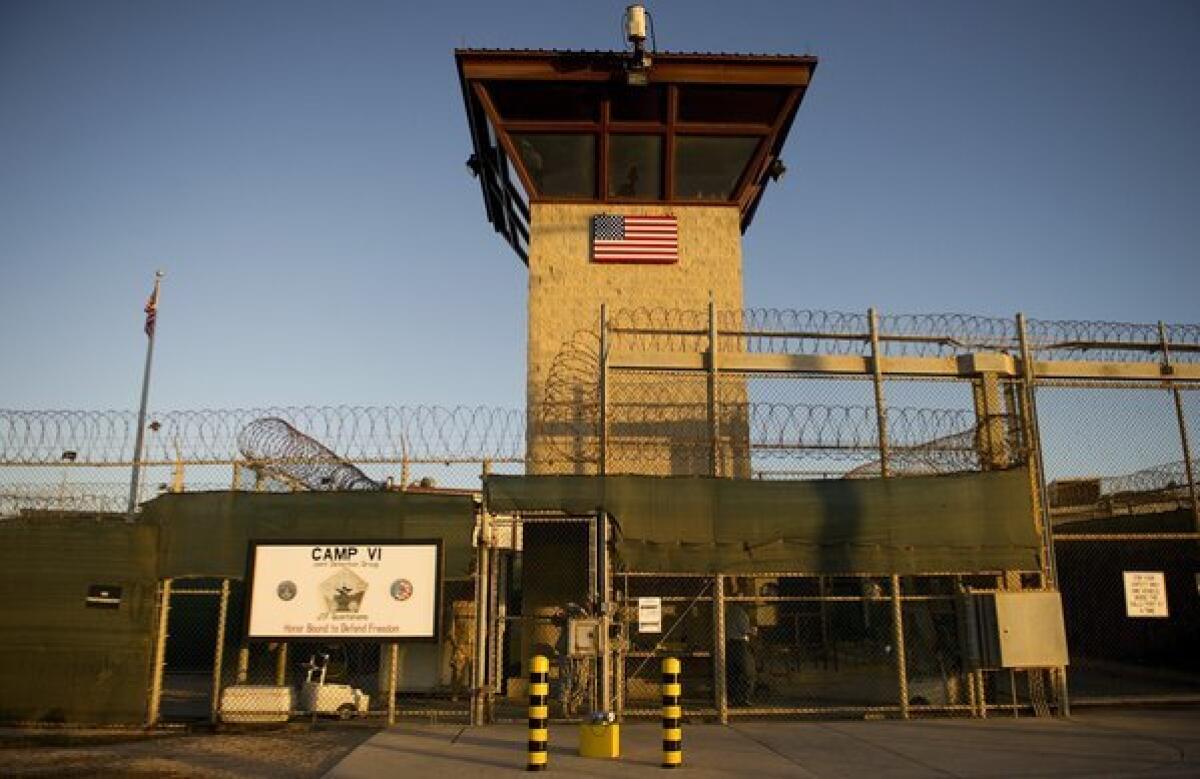Op-Ed: John Adams would have defended the detainees at Guantanamo Bay

âSo you ⌠defend terrorists?â
This is a question that my fellow military commissions defense attorneys and I are often asked. When friends and family members wonder about the work I do representing a detainee held at Guantanamo Bay, I usually offer something quippy about defending âconstitutional valuesâ or âthe rule of law,â and quickly move on.
After all, talking about our clients, who have been tortured and imprisoned for years, isnât standard fare for casual family gatherings, nor is advocating for a nuanced view of their legal predicaments.
But itâs important for Americans to understand the facts of what happened to the 40 men still held at Guantanamo Bay, a prison that has been open since 2002. As President John Adams once said, âfacts are stubborn things,â and the trials to determine those facts must be carried out justly, regardless of our passions. Defending those men in their trials, and discussing our work openly, is a responsibility we embrace, and there is no better place to start that discussion than with torture.
Growing up in a Jack Bauer-ized world, many of my generation have an indelible belief that torture works. Thereâs a nuclear bomb in Los Angeles, so Kiefer Sutherland has to put a knife through the kneecap of the bad guy, threaten their family, and after some intense moments, the terrorist will give up the location of the bomb.
Of course, in the real world, it doesnât work like that. Aside from questions of ethics and morality, torture is illegal. Itâs also ineffective. This was the bipartisan conclusion in the Senate Select Committee on Intelligence report of 2014, based in part on studies done by the CIA itself, which previously eschewed torture in favor of more reliable methods of interrogation.
Apart from being ineffective, torture is often counterproductive. Many of the detainees subjected to it simply lied to get it to stop. For instance, a detainee named Abu Zubaydah, a Guantanamo detainee who was subjected to lengthy torture, gave false statements about Iraqi weapons of mass destruction that were subsequently used to justify the 2003 U.S. invasion of the country.
However, the legal issues we deal with as defense lawyers go far beyond torture. Take the case of Abd al Rahim al Nashiri, a Saudi accused of masterminding the attack on the U.S. guided missile destroyer Cole in 2000. In addition to torture, his case so far has involved: 1) the government having secret listening devices in defense attorneysâ spaces; 2) the trial being forced to go forward despite having an unqualified defense attorney; 3) the judge trying to get a job with the Justice Department while overseeing the case, resulting in a federal appeals court throwing out more than three years of rulings; and 4) confidential communications between the judge and defense attorneys being inadvertently turned over to the prosecution. And thatâs just from one detaineeâs case.
Others have waited nearly two decades without their day in court. One such person is my client, a Malaysian named Nazir Bin Lep, who has been held in black sites and Guantanamo for over 16 years. For the first three, he was severely tortured. He is suspected of having been tangentially involved in attacks in Indonesia in 2002 and 2003, but has never been charged. While these were tragic and devastating crimes, there is no evidence that he planned or carried them out, or even that he knew anything about them. Furthermore, he had nothing to do with 9/11, the Cole bombing, or any attack on the United States.
Earlier this year, the U.S. government looked ready to finally charge him by proposing a classified, secret process. But a federal judge in October found that the proposal would âirreparably taintâ any future trial, and ordered the government to cease and desist. As a result, Bin Lepâs status remains unchanged, and he remains shackled in a cell without an end in sight.
To be clear, defense attorneys certainly donât condone terrorism or criminal acts. Many of us were personally affected by 9/11, or had friends and family members who were. But merely being charged with a crime does not make one a criminal, nor do criminal acts justify abridging indelible legal rights. Like my client, most of the men in Guantanamo have never had any charges filed against them.
The historic significance of these cases cannot be overstated. President Adams, for one, was personally invested in work like ours. As a young lawyer with unbridled ambition, he chose to defend the British soldiers accused of committing the Boston Massacre. Adams did this despite the risk to his political aspirations, financial well-being, and the very safety of himself and his family. In the end, the soldiers were acquitted of murder by a jury of colonists, and in later life Adams said his work on this case was one of his greatest services to his country because it upheld the rule of law in that moment of political crisis.
We cannot turn away from the fundamentals of our justice system â especially when weâre confronting its most difficult and trying cases. Our principles, as exhibited by Adams in his defense of the British soldiers, must not be abandoned now.
So do we âdefend terrorists?â Arguably, but thatâs not the right question. We defend our clients, and in doing so, defend the essential values of the American legal system.
Aaron Shepard is a lieutenant commander in the U.S. Navy Judge Advocate Generalâs Corps. The views expressed do not reflect the views of the Department of Defense, the U.S. government or any of its agencies or instrumentalities.
More to Read
A cure for the common opinion
Get thought-provoking perspectives with our weekly newsletter.
You may occasionally receive promotional content from the Los Angeles Times.










